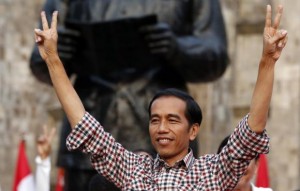
BY FERGUS JENSEN AND FRANSISKA NANGOY
(Reuters) – Indonesia’s Joko Widodo took over as president of the world’s third-largest democracy on Monday with supporters’ hopes high but pressing economic problems and sceptical rivals set to test the former furniture businessman.
Widodo won a narrow victory over a former general in a July election with promises of clean government and tackling entrenched interests. It was the first time in the young democracy’s history that a president was elected from outside the established military and political elite.
“This is the time for us to unite our hearts and hands, this is the time for us … to reach and realize an Indonesia that has political sovereignty, economic independence and cultural character,” Widodo said in his inaugural speech to a packed parliament.
U.S. Secretary of State John Kerry attended the inauguration along with various Asian leaders including the prime ministers of neighboring Malaysia and Singapore, the Sultan of Brunei and Australia’s prime minister.
The former mayor of the city of Solo and governor of the capital, Jakarta, is untested on the national and international stages but he already faces resistance from the establishment to his transparent, can-do approach to governance.
“He has climbed up to the top of the pyramid but he’s still weak within the powerful political class,” said Achmad Sukarsono, a political analyst at the Habibie Center, think-tank.
Thousands gathered on the streets of the capital, Jakarta, waving flags and banners to celebrate the unprecedented ascent of the small-town businessman to leader of the country with the world’s biggest Muslim population.
“This is the first time we’ve been this happy after voting,” minibus driver Susanto said while waiting for Widodo and Vice President Jusuf Kalla to pass by on a horse-drawn carriage.
“The government is truly close to the people.”
Widodo, 53, is an avid heavy metal fan and is expected to join the celebrations later on Monday and jam with a rock band.
The new president has been struggling to build support in parliament without indulging in the old game of trading support for jobs, but his refusal to swap cabinet posts for backing has driven unaligned parties to the opposition, leaving him with a minority that is set to face resistance to his reforms.
Even Widodo’s staunchest supporters have worried that his principles might stymie his reforms. But the lean, affable president with a common touch has been resolutely optimistic about working with the legislature.
After weeks of gridlock, Widodo last week sought to improve ties when he met with opposition leader Prabowo Subianto and prominent opposition member Aburizal Bakrie, who congratulated him and pledged to support his government, though reserving the right to criticize.
BACK TO THE SEA
Widodo focused much of his inaugural speech on his plan to make Indonesia, a sprawling archipelago of about 13,500 islands, a maritime power.
“We have for too long turned our backs on the ocean, the straits and the bays. This is the time for us to restore it so we will prosper like our ancestors,” he said, referring to the archipelago’s maritime heritage.
He has promised to expand the country’s ports to help revive economic growth, but will need to find the funds for such an ambitious project.
His first big test looks set to be cutting fuel subsidies in the next two weeks to avoid breaching a legal limit on the budget deficit, which is under pressure from a shortfall in tax revenues and the slowest economic growth in five years.
Higher fuel prices have sparked protests in Indonesia before and contributed to the downfall of long-serving autocrat and then president Suharto in 1998.
Within weeks of taking office, Widodo will be in international limelight with an Asia-Pacific summit in Beijing and a G20 summit in Australia.
Kerry, who will meet Widodo later on Monday, will urge him to maintain the active role in regional foreign policy pursued by the previous administration, amid concern the new president may be more inward-looking given a preoccupation with domestic agendas.
“What we see in the region is a pretty steady calling for Indonesia to remain active in foreign affairs,” said a U.S. official traveling with Kerry said.
Kerry will also meet the prime ministers of Malaysia and Singapore, the Sultan of Brunei, Australia’s prime minister and the foreign minister of the Philippines and will seek more help in the U.S.-led effort against Islamic State in the Middle East.
His discussions will cover ways to block recruitment of fighters, preventing the return of hardened fighters to the region and blocking financing, a U.S. official said.
(Additional reporting by Kanupriya Kapoor, Eveline Danubrata, Gayatri Suroyo, Nilufar Rizki, Dennys Kapa and David Brunnstrom; Writing by Randy Fabi; Editing by Robert Birsel)







